Time flies when you’re having fun! We’ve been living life on the road for over 90 days. While it’s been amazing, we’ve learned some important lessons along the way.
Small space living is becoming more popular. Recently we laughed as we read an article entitled, “Dear People Who Live In Fancy Tiny Houses” because the questions posed are so true. Even after 90 days into our own small space adventure, we still don’t have all the answers. But we have learned a lot about traveling and living life in a motorhome.
When we started our adventure at the end of April, we had no idea what to expect. We certainly didn’t expect it to be easy, but neither of us really fancied it would be hard either. Don’t get me wrong, most days appear idyllic: the sun is shining, the view is incredible, we get our work done, and we can enjoy an evening in our new surroundings.
But some days just spiral downhill. Everything is 10x harder than it should be: we can’t find a place to park and spend three hours driving around; something breaks; there is no hot water because the LPG system doesn’t work properly; getting out one basic ingredient requires emptying an entire cabinet; etcetera. Nothing, absolutely nothing seems to be right in the world and we just want to give up (or throat punch the other person).
Thankfully those days are few, but it does happen. If you think life in a small space is paradise, it is… but paradise still gets a few storms! (it wouldn’t be green without the rain, right?)
Observations on Traveling Full-Time
Full-time travel is challenging. Even more so when confined to a small space 24/7. Here are five observations I (Andrew) have made about traveling together after 90 days on the road:
- Everyday is an adventure, enjoy it. We have no idea what we will see, experience, hear, or even do every day. There is very little consistency other than the rhythm we are trying to build around each day. Sometimes this makes travel frustrating but it has also revealed some spectacular parts of Europe we didn’t even know existed. Travel should challenge each of us, because it forces us to learn and to grow.
- Motorhome’s are big! Amelia weights 3500kg (with all our stuff) and measures 6.5m long, 2.4m wide, and 2.9m tall. Her front grill is also surprisingly low. I have learned this by hitting not one, but two trees with the back left fender and by scraping the front grill through gravel. I’ve learned (the hard way) to be patient and to ask for help. I’ve learned this lesson before about traveling, but I feel chastened to have learned it again.
- Everything has its place and everything must always be returned to its place. There is no room in a small space for things to pile up. Space is at such a premium that before we bring anything into the motorhome we must first carefully consider where it will be stored. Same for food. Our fridge is big by motorhome standards, but it still only holds 2-3 days worth of food. We’ve already spent a day removing the items we don’t use. Balancing what you need versus what you want is an ongoing battle when traveling.
- Give each other space. A corollary to #3, with two people and two cats, there is no way to escape (unless someone wants to sit in the bathroom). Sometimes one of us just needs to step away and let the other one have some space to breathe. We are working hard on finding ways to support each other without stepping on toes.
- Traveling in a motorhome can be quite cost effective. We planned for this when we budgeted but didn’t realize just how cost effective it can be. France has a huge network of free overnight parking spots for motorhomes, called Aires. Other countries have similar networks but not nearly as extensive. In 90 days of travel we’ve only paid for 15 nights and our most expensive Aire was 8€ per night. If you stay in a campground every night, the price goes up quickly. But if you want a different travel experience, compare the cost of renting a motorhome to staying in hotels, B&Bs, or holiday rentals. Motorhome rental prices seem high, but if you stick to the free parking spots your cost per day will be the same or better and you’ll get to visit places off the tourist track.
A few other quick tips we’ve picked up:
- When you have access to a real shower, use it. As frequently as possible.
- Go outside. The outdoors is like a really big living room.
- Trees bite. Stay away from trees.
- We are rarely in a place where we can plug into 230V power meaning our primary power source is a large battery charged by the engine and a solar panel. Thus if it’s sunny or we’re driving, plug in all the electronics. Don’t charge at night or you’ll have a flat battery in the morning!
- Double the estimated time to get anywhere. Then add some extra time just in case.
- Bungee cords are extremely useful, bring lots.
- Be patient. You’re not in a hurry.
- See point about trees above.
I’m sure there are plenty of other tips I’ve already forgotten about, but the above is already a long list!
Your turn. I’d love to know if you have any tips for people living in tight accommodations.
How do you cope?
Andrew
Latest posts by Andrew (see all)
- Reflections on motorhome living after 90 days on the road - August 8, 2015
- Day 17 – On our way to the Centre of France - May 16, 2015
- Day 16 – Exploring the Cherbourg Peninsula - May 15, 2015

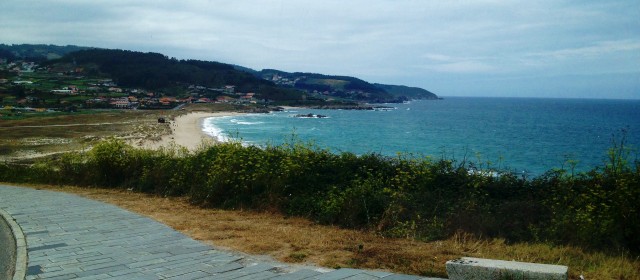
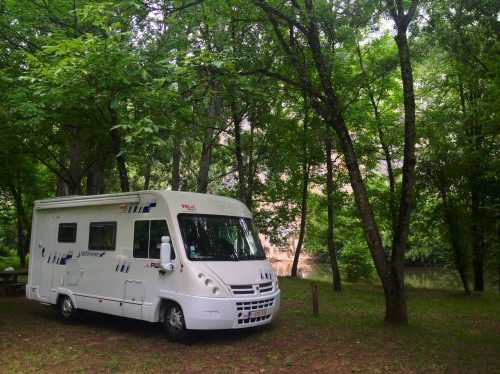
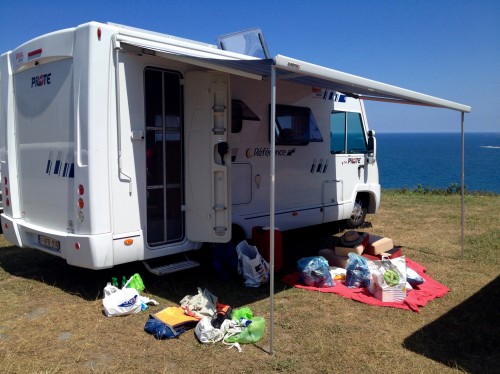
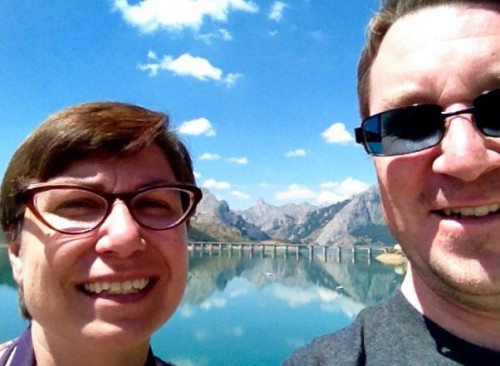
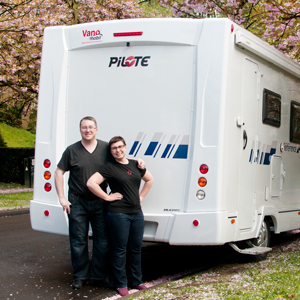





6 Comments
Are you guys still travelling, or have you decided to call it a day? I ask, because my wife and I are planning a year-long ‘adventure’ in Europe whilst living in a motorhome. Wondered if you guys had just decided enough is enough, and if so, why?
Hi Steve! Welcome and thanks for commenting. Your adventure sounds great! Everyone should give it a try as it is a great way to learn about just how much space and ‘stuff’ you need for day-to-day living.
We’ve not given up on the full-time motorhome lifestyle, but we did have to make another big change. In August 2015, we found out my father-in-law was very sick, so we put our travels on hold while we returned to Canada to help out. While in Canada, we realized we were going to be needed in Canada for the foreseeable future, so we shifted continents. In March 2016, we bought a motorhome in Canada (a BigFoot 29′ Class C we call Yeti) and we are currently in the process of trying to sell Amelia in Spain (looking for a nice, previously used Pilote G630XXL?). You can read more about adapting our motorhome travel plan on CheeseWeb.
We still have lots of stories from our 2015 travels to share, it’s just not been a priority, unfortunately. We are also now working on stories about traveling in Eastern Canada while living full-time in a motorhome. I will say there is a big difference between European and North American motorhomes! So, while we’d love to still be on the road in Europe, we are fortunate to have the flexibility to be back with family when we are needed.
All the best on your trip and please let us know how you get on! Where are you heading first?
My wife and I are planning almost exactly the same thing. We want to go full time RVing with our two cats. What is your experience with the cats on board. Are they stressed while traveling or did they get used to it? Can you let the cats out? Do they see the camper as a homebase they return to?
Greatings from Gent
Hi Manu! Eventually, we will write about our experience with the cats (I think we did record a video about them, but I’ve not yet posted it… waaaay behind). In short, they have become great travellers! Our first couple of days were rough. We kept them in some collapsible crates which are really well built, however the cats were not so happy about being cooped up. On our third day, we decided to let them move around and find their own spots while we drove. Suddenly they were fine: no screaming or scratching. There is a risk letting them wander about while driving, but for the small distances we planned to travel, it was less of a headache (literally!). They have since become very comfortable with driving in the motorhome although if we have a long travel day, they do get a bit stir crazy.
As for letting the cats outside the motorhome, we planned to allow them to go out on a harness. Our cats have always been indoor cats, they have no survival skills and we wouldn’t let them out on their own. I have seen one person traveling with a cat he let out on its on, but you have to have a lot of trust in your cat (and the neighbourhood) to do that. Also, if you are overnighting at a roadside aire or France Passion farm, you wouldn’t want to let your animals roam free anyway. You certainly won’t be allowed to let them roam free in a campground. If your cats are used to being outside, you should start working on acclimatising them to being indoors, using a litterbox, and walking on a lead. You could also look at buying a larger collapsible pen you could set up outside (again, would be a challenge to set up at an aire because of the overnighting rules).
Anyway, we’ve really enjoyed having the cats along on the journey. It is nice to be able to relax with them around and see the things that make them curious. It also helps to have a couple of small warm bodies to snuggle with on a cold night! 🙂
Good luck and goede reis!
Andrew,
I was wondering if you had any trouble traveling between countries with your cats? My husband and I were thinking about traveling in a motorhome throughout Europe with our 2 small dogs, but we weren’t sure about how difficult this would be bringing pets into each country.
Also, I like your advice and renting a motorhome instead first to make sure we like it. Do you have any preferred motorhome rental sites? Thanks for all your insight!
Hi Tami!
No, we had no issues traveling between countries with our cats. Before we left Belgium, we made sure both cats had up-to-date rabies shots and official European Pet Passports documenting their vaccination. Really, this is only necessary if you are stopped by the police and they demand to see the passport. We didn’t end up using it at all during our travels.
As for renting motorhomes, we have no particular preference. Back in 2014, I did a lot of research on the available motorhome rental locations in Belgium but not Europe-wide. I’m not sure anything I have would be of use to you today. One tip though: if you plan to travel in Europe, rent something in continental Europe, not the UK. The main reason for this is because of the whole left-hand vs right-hand drive. I would also suggest you rent from a business which speaks your preferred language. The contracts will almost certainly be written in the language of the country you’re in (or linguistic region, if you’re in Belgium), so it is important to have someone who can explain the terms to you before you sign.
It may sound daunting, but the experience is definitely worth the hassles! Good luck and let us know how you get on!